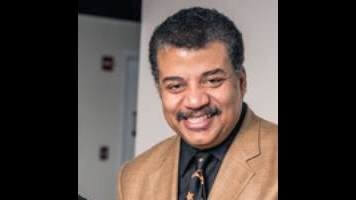StarTalk’s star talks too much

Fox’s Cosmos: A Spacetime Odyssey didn’t just revive the tradition of high-minded science TV embodied by Carl Sagan’s original Cosmos series. It also made Neil DeGrasse Tyson, the astrophysicist who heads up the Hayden Planetarium in New York, the implicit heir to Sagan’s mantle as America’s mass-media science educator. Tyson has parlayed his heightened profile into a TV show (shot at the Hayden) on National Geographic channel, StarTalk, which adapts a long-running podcast of the same name. Tyson struggles to adapt along with it.
Most of Tyson’s previous on-camera gigs—like Cosmos, Nova ScienceNow, and an excellent video lecture series (available on Netflix) called The Inexplicable Universe—have featured the cosmologist by himself, addressing the audience directly. Tyson thrives in this professorial setting, as the slow cadence of his baritone suits his careful, step-by-step explanations of big scientific concepts. But on StarTalk, Tyson must interact with guests, and his instincts fail him. He’s impatient. He rambles. And he sands down the edges on every topic rather than raising his viewers up.
The stated premise of the series is that it combines science with pop culture, and to that end, the premiere dedicates itself to reflections on Star Trek. The producers could not have chosen a more thuddingly predictable topic, and the dullness is exacerbated by the fact that Tyson does not appear to know or care very much about Trek.
He’s joined by comedian (Tyson: “professional comedienne”) Leighann Lord and astrophysicist Charles Liu. Both guests are avid Trek fans, while Tyson evidently works off decades-old remembrances of the original ’60s series. Lord is billed as Tyson’s “co-host,” an inapt holdover from her more robust role on episodes of the StarTalk podcast. She performs no discernible hosting duties on StarTalk, even though the show would be improved if she did. Lord’s focus sometimes drifts in the middle distance as she wonders what role she’s supposed to play in the chat. She’s often more expert than the host, but she can also tell that StarTalk isn’t supposed to work that way. It’s awkward.
Tyson is like a man who brought a knife to a discussion of Star Trek, but he tries to keep up the appearance of an admiring fan. Early on, he perorates a discussion of Gene Roddenberry’s liberalism with a halting observation that “Spock himself is… [Long pause, thinking.] …a… [Only slightly shorter pause.] …half-alien, half-human!” As Tyson practically crumples from the effort of recalling that trivia morsel, Lord notes that Spock is, to be specific, “half-Vulcan.” Annoyed, Tyson grumbles, “Is ‘Vulcan’ not alien?” He passes it off as a joke, but it isn’t quite funny enough to be a joke. It is, however, indignant enough to be funny. Prickly Neil is good.
Lord and Liu do have insights into Trek culture and scientific research, but the show is too choppy for them to establish any rhythm. Tyson talks over his guests, eager to speak, yet after the interruptions, he stumbles and vamps through his own points. These style critiques are perhaps the product of first-show nerves (if this was the first one taped). The more disappointing shortfalls are in the substance. It’s dissonant to see Tyson, a self-styled leading thinker, expressing wonder at trite “Star Trek came true!” talking points. Did you know that Captain Kirk’s communicator looked a lot like a cell phone? Yes, you did. Tyson should challenge the viewer—and himself—more than this.
The panel discussion is intercut with clips of a celebrity interview conducted by Tyson—Star Trek’s George Takei in the premiere. The idea is that the interview will spark conversation among the panelists. In practice, the constant transitions between interview and panel sap StarTalk’s already meager momentum. Tyson’s nomadic segues don’t help: “We’re featuring my interview with George Takei. He came through town. I snared him. Put him in my office. And we just talked. We were like old buds. We, like, went on and on and on, like, about everything. We can’t fit it all in the show. Totally chillin’. We talk about everything.” The Takei chat is indeed wide-ranging—the most fascinating part is Takei’s reflection on his childhood years in a World War II internment camp—but it does little to enliven the panel segments.
StarTalk’s second episode is bolstered by the presence of Eugene Mirman, the comedian and Bob’s Burgers star, in the purported “co-host” chair. Because he slots more readily into the “witty rube” role than Lord, he has an easier time. Mirman gets into a couple of lively exchanges (about black holes, neutron stars, and such) with the episode’s scientist guest, cosmologist Janna Levin. These exchanges are reliably derailed by Tyson, who barrels in to provide needless explanation or to steer the chatter in his preferred direction. At moments like these, an awkward truth of StarTalk emerges: It would be a more watchable show if Tyson were stuck in the bathroom the whole time.
The host can get better, though. He deserves the chance, if only because effective science communicators are rare, and Tyson has a good track record. He has certainly earned the stage of this modest basic-cable chat show. Now he needs to act like his guests have earned it too.